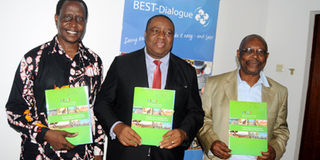Corruption ‘is the bane of business’

Tanzania Private Sector Foundation (TPSF) Executive Director Godfrey Simbeye (centre), Tourism Confederation of Tanzania Executive Secretary Richard Rugimbana (left) and BEST-Dialogue Deputy Project Manager Ali Mjella display the TPSF sixth survey report on business leaders’ perception of the investment climate in Tanzania during its launch in Bagamoyo.
PHOTO | COURTESY
What you need to know:
- The sixth Business Leaders’ Perceptions of the Investment Climate in Tanzania Report – 2015 released at the weekend mentions corruption as the issue that has been least addressed by the government.
Bagamoyo. Tanzania’s business community is facing several challenges but this time corruption is identified as the biggest impediment that the private sector thinks should be the priority for action.
The sixth Business Leaders’ Perceptions of the Investment Climate in Tanzania Report – 2015 released at the weekend mentions corruption as the issue that has been least addressed by the government.
The survey, which was conducted between July and August 2015, says doing business in Tanzania is becoming harder and that the government is making insufficient efforts to address key issues, except electricity generation and supply. The findings released by the Tanzania Private Sector Foundation (TPSF) say factors that make it difficult for businesses to grow include tax administration, level of taxes, corruption and access to finance.
However, the private sector is banking on President John Magufuli whom they say has started taking some actions that create discipline in the government since he took-over about a year ago.
“The new leadership has come with a different approach and we are confident that something will happen. Some initiatives such as the Big Results Now are no longer operating, but at least the new government has created discipline in the civil service and that’s good for us,” TPSF Executive Director Godfrey Simbeye said at the launch of the report.
Why corruption?
Until 2015 power was the biggest problem business leaders wanted fixed, but now it is corruption.
“The survey was conducted near the General Election and experience shows that corruption goes up during the election year,” said Mr Hussein Kamote, CTI Director of Policy and Advocacy.
The report indicates that scores for corruption are quite high in all sectors but the highest in finance and manufacturing sectors.
Corruption is said to cause the most difficulty in the tourist city of Arusha and closely followed by Mwanza and Iringa. However, Zanzibar is the place that worries least about corruption, according to the report.
The biggest businesses are also said to suffer the most problems with corruption meaning that they become a target as they grow.
While corruption covers all sectors, ranking shows it’s low in the construction where one would expect it to be rampant.
“Indeed, that might be the problem; it has become so much the norm that it no longer deters investment in the construction. Corruption is least deterrent in agri-processing also,” said the report.
Taxation
The business leaders are not happy with the levels of taxation and the way it’s administered saying that Tanzania taxes are so high that they discourage taxpayers to comply.
“When this problem is allied with the challenge of corruption in government procurement, one can see why there is so much dissatisfaction with tax rates and tax administration,” states the report.
“Certainly, there is a challenge here for the private sector to recognize that the government has to collect taxes – probably at higher rates than now – but there is also a challenge for the government to spread the net more widely and to make the system as efficient as possible,” the report comments.
An example of the high tax rate the business leaders cite is the 18 per cent value added tax (VAT) in Tanzania, which, they say, is the highest among East African Community member states.
Although the business leaders said they were willing to pay the taxes, they want reforms in both levels and administration to make it easy for them to comply.
“Officials from Tanzania Revenue Authority (TRA) can come today and give an assessment of what you are supposed to pay and others come next time and give a different figure although they used the same documents. Who do you trust in such kind of situation? It’s so confusing,” said TPSF Policy Director Mr Gilead Teri when he presented a summary of findings. “I think there is a relationship between tax administration and corruption...one may be fuelling the other,” he added.
Businesses also complain that they spend much time to deal with paperwork, registration and pay the multiple taxes instead of concentrating in running and growing the businesses.
Tax administration is said to be a deterrent in many sectors but hurts the most of investments in manufacturing, tourism and trade. A recent report said for example that tourism investors in Zanzibar are required to pay 48 different taxes.
“What the private sector wants are reforms in the business environment for investors to grow and expand. When they grow, they create more jobs and even pay more taxes. All these are healthy to the economy,” said Mr Simbeye.
Power
The report says power had improved by the time of the survey but the improvement was not uniform across the country.
It was found that power makes business particularly difficult in construction and least difficult for agriculture and agri-processing.
Manufacturing sector which for a long time has been crying of erratic power supply did not find it making life difficult following improvement in both availability and supply.
On power supply, Mr Kamote said it was stable, but tariffs were too high compared with other countries that were competing with Tanzania in manufacturing
“We are talking of countries like China and India whose products are dominant in Tanzania. Local products cannot compete with those from the said countries because our production costs are too high compared with them,” he added.




